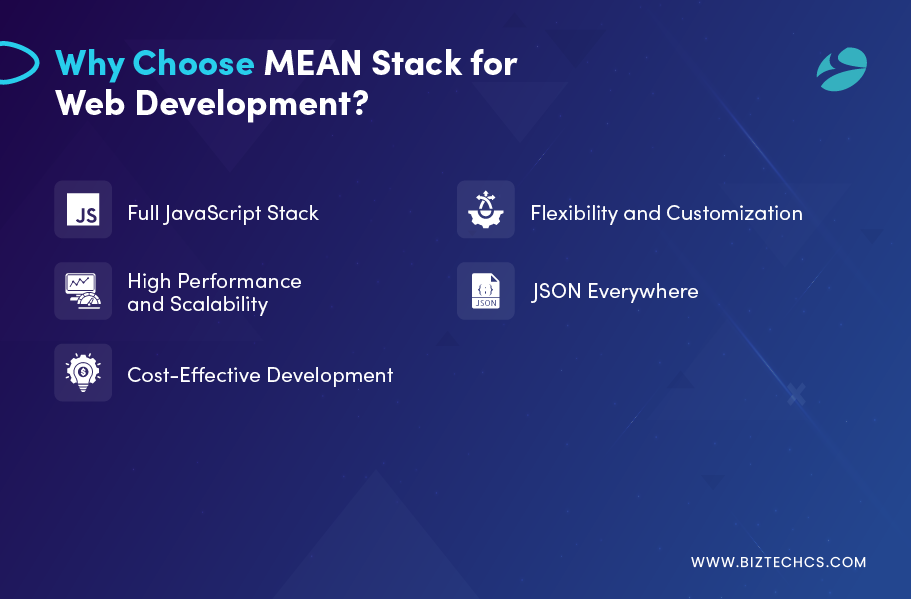824
What Makes Hiring MEAN Stack Developers a Strategic Move for Modern Web Development?
03 Sep, 2024
5 min read
824
03 Sep, 2024
5 min read
Table of Content

It’s becoming a smart thing for businesses that are interested in modern web development to make hires with MEAN Stack developers.
Hence, the MEAN stack must be considered since it presents a stable solution to boost interest in dynamic, scalable, and real-time web applications.
These technologies include MongoDB and Express. js has come a long way and is now a preferred script by many developers and companies. Increased speed and efficiency are other benefits of the MEAN stack development process, which does not mean reduced quality.
Thus, using MEAN stack technologies allows for developing applications that will remain highly relevant in the years to come.
This blog will focus on the changes that the MEAN stack has undergone in the current world of web development and why hiring other MEAN stack developers is important for your next project. Learn how this approach can enrich the plan of your development.
The MEAN Stack refers to a number of related technologies used in modern web application development including MongoDB, Express.js, Angular, and Node.js.
These technologies complement one another, enabling MEAN Stack developers to create highly effective and adaptive web applications.
MEAN Stack development process is a series of steps through which MongoDB is used as a database, Express. JS is the web framework Angular for the front-end development and Node.js for the server-side.
These changes have led to the MEAN Stack becoming increasingly popular for developers seeking to develop robust web applications.
These MEAN Stack technologies allow developers to manage both the front end and the back end using JavaScript as the language. This makes the MEAN Stack to be widely embraced in modern web development.
 1. Full JavaScript Stack
1. Full JavaScript Stack
MEAN stack technologies provide an integrated and efficient platform for modern web development as JavaScript is utilized at the client and server tiers and for database operations.
Due to the implementation of MEAN stack development, the projects are more manageable since the code will be uniform, and the developers will not have to switch between languages constantly.
When businesses want to advance their projects, hiring MEAN stack developers conversant with this technology promotes quicker acquisition and speedier delivery.
2. High Performance and Scalability
The MEAN Stack Development Process integrates Node. js for high performance and scalability because it easily handles many connections using events.
MongoDB is an essential component of Mean Stack Technologies, allows for a lot of variety in managing and scaling large and complex datasets using JSON-like structure and horizontal scaling.
In order to design contemporary websites best suited to develop web applications capable of handling large traffic, it is wise to rope in Mean Stack Developers who have a good grasp of these tools.
3. Cost-Effective Development
The technologies used in MEAN stacks are open-source and free; therefore, implementing the MEAN stack is affordable and perfect for startups.
The majority of frameworks and tools that speed up modern web development have extensive and very active communities.
One more benefit of getting MEAN stack developers is that you are provided with a lot of tools and libraries which contribute to decrease the time-to-market.
4. Flexibility and Customization
Express.js is a lightweight framework that is used in the MEAN Stack Development Process to enable developers to organize their web and mobile applications in any way they wish.
Angular, which is incorporated in Mean Stack Technologies, helps to ease the development of today’s mode web applications because of its features in building single-page applications.
For companies interested in utilizing these tools, it is crucial to employ Mean Stack developers adept in creating and supporting extensive applications.
5. JSON Everywhere
In the MEAN Stack development process, data flows smoothly through all layers because JSON is consistently used.
From MongoDB storing data in JSON-like documents to Express.js, Node.js, and Angular handling data in JSON format, the need for data transformation is minimal.
To leverage the efficiency of modern web development, it’s wise to Hire Mean Stack Developers who can fully utilize this seamless integration in MEAN Stack technologies.

1. Evaluate Full-Stack Proficiency
A proficient MEAN stack developer should have a clear understanding of MongoDB, Express.js, Angular, and Node.js.
They should have experience in developing and supporting applications that leverage all these technologies.
It includes code related to server-side rendering, databases, and management of complex front-end frameworks.
The possibility of toggling between different versions of Angular or even migrating to other frameworks such as React or Vue.js.
An ideal candidate is a developer who is new technologies-savvy and can incorporate them in the MEAN stack.
2. Project Architecture and Scalability Expertise
The candidate should incorporate knowledge of how to design microservices using Node.js, particularly for decomposing large applications to improve their extensibility and sustainability.
They should be conversant with MongoDB, capable of designing schemas that improve performance, familiar with how to index and deal with huge data sets.
It also should have DevOps experience and practices where testing, deployment and scaling are performed using CI/CD pipelines in cloud platforms such as AWS or Azure.
Knowledge of these areas is necessary to avoid obstacles in development and deployment processes.
Their skills should prove that they are competent to work on challenging projects with an emphasis on the performance and the ability to scale the processes.
3. Advanced Knowledge of Angular
For a strong developer, one should have a deep understanding of how Angular is built on a component-based system.
It should also be possible for them to produce standardized and generic sets of parts that can be easily updated.
They should also have worked with improved state management by utilizing tools like NgRx or Akita in large scale applications.
They should be able to show how they have dealt with state in efficient way in previous projects.
In these circumstances, being able to execution tasks without complicating things with should be among their strengths.
4. In-Depth Node.js and Express.js Skills
A strong Node.js and Express.js developer is well versed in asynchronous programming and has no difficulties writing callbacks, promises, and async/await to handle non-blocking tasks and comprehend the concept of event-driven architecture.
They always consider security, for example, they employ ways of avoiding SQL injection, XSS, and CSRF and frequently employ Helmet to secure HTTP headers.
Their skills also include writing and customizing middleware and using it in logging, authentication, error control, and sessions.
Owners of middleware products show a good understanding of how this layer can improve the performance of an application. These skills guarantee that applications incorporating them are efficient, safe, and easy to manage.
5. Soft Skills and Team Integration
Another aspect to consider when hiring the MEAN stack developer is their ability to relate to special teams, the front end and back end.
This is important because most interact with various functionalities throughout the application.
Review their work history in collaborative spaces, especially in Agile, and see whether they can write concise and easy-to-understand documentation.
With senior candidates, learn if they are willing to help junior developers, teach them something new, and conduct code reviews.
They shall better position themselves to lead others and share with the rest of the team their recommendations for best practices.
1. Identifying Full-Stack Proficiency
Recruiting MEAN stack developers is a little difficult because candidates today are proficient in one or the other technology, such as Angular or Node.js.
It may be reasonably well-rounded in JavaScript but not as in-depth with other frameworks such as MongoDB or Express.js.
It becomes very challenging to have a resource that is good at both the front end and the back end, and lately, databases as well.
To avoid this, begin the interview with a coding question that requires candidates to demonstrate basic javascript knowledge and understanding of asynchrony.
Subsequently, perform specific assessments or questionnaires for each technology in the stack to gauge their familiarity with MongoDB or Express.js.
This process also guarantees that the candidates being hired are well-rounded, full-stack candidates and not individuals with specialized strengths in only one area.
2. Evaluating Real-World Problem-Solving Ability
Companies and employers have always been concerned about ensuring that the MEAN Stack candidates they are hiring possess the skills to solve real-life problems rather than the general use of technologies.
Other skills involve proficiency in MongoDB, Express, Angular, and Node.js but do not necessarily mean the capability to handle problems such as scale, security, and modality in a realistic context.
To address this, it is useful to pose scenario-based questions, and the applicant may be asked to demonstrate coding during the interview.
While requesting a candidate to solve certain problems, like the MongoDB query performance optimization or the RESTful API design with account for its security and scalability, you will be able to evaluate the candidate’s skills in real-world problem solving.
This approach helps guarantee that the candidates can solve problems that they will likely encounter in the workplace using the technical skills they have learned.
3. Ensuring Continuous Learning and Adaptability
Hiring MEAN Stack developers comes with the challenge of keeping up with rapidly evolving technologies, especially with Angular’s frequent updates. This can result in skill gaps if developers don’t actively engage in continuous learning.
To address this, ask candidates during interviews about their recent learning experiences and how they stay current with the latest MEAN stack trends.
Providing professional development opportunities and encouraging involvement in tech communities can help keep their skills current. This ensures they remain adaptable and ready to tackle new challenges as the stack evolves.
4. Balancing Speed and Code Quality
One of the issues of recruiting MEAN Stack developers is that the quicker development approach may be compromised.
The problems are created through the pressure on the developers to start working on various features with Node.js frequently.
It is actually due to js and its asynchronous working and the complications coming with Angular. This can lead to what is commonly known as shortcuts in code quality.
To address this, the code review process should be formalized, and everyone should adhere to coding guidelines within the team.
Select those who know the importance of clean and maintainable code, and use ESLint or Prettier, or similar services that may automate it.
5. Security and Best Practices Knowledge
Quite often, hiring MEAN Stack developers can be challenging as it can be difficult to guarantee that the team is familiar with security, especially when it comes to asynchronous programming in Node. js, where some errors are fatal and can be used to open threats.
They stated that many developers have no prior experience with security best practices, which may pose a threat to your application.
To address this, incorporate specific security questions in your technical testing exercises. For example, you should assign candidates tasks such as identifying and correcting security issues in a specimen Node.js app or explaining how to protect the MongoDB database.
It assists you in getting reliable developers who can deal with security issues and relevant risks appropriately.
To sum up, hiring MEAN Stack developers could bring many benefits to your web development projects, including a more efficient and well-ordered application architecture.
JavaScript used throughout MEAN Stack and the flexibility of solutions provided are the main reasons it is the modern solution.
Given its capacity to support and address complicated and evolving applications, MEAN Stack development is viewed as a proper direction to provide businesses with long-term benefits.
So if you plan to outsource for MEAN Stack candidates, we at Biztech have the right talent pool for the job.
Contact us now, and let us take up the challenge of creating something extraordinary.

Storyblok
558
By Devik Gondaliya
01 Apr, 2025

Storyblok
1640
By Devik Gondaliya
27 Mar, 2025

Devops
Healthcare
1853
By Devik Gondaliya
20 Mar, 2025